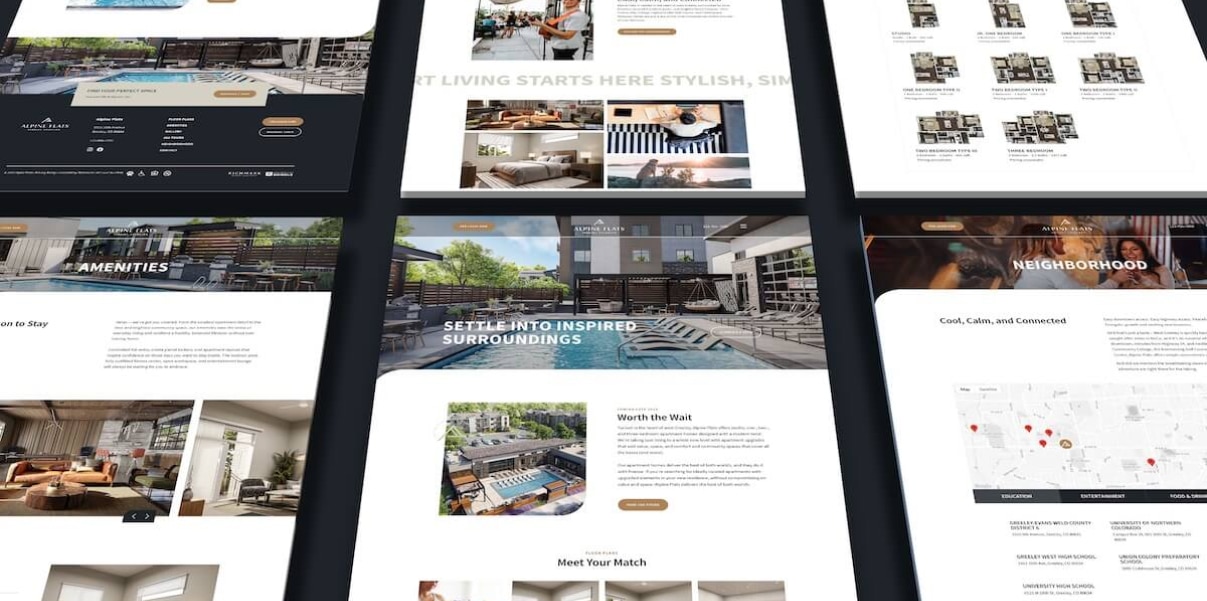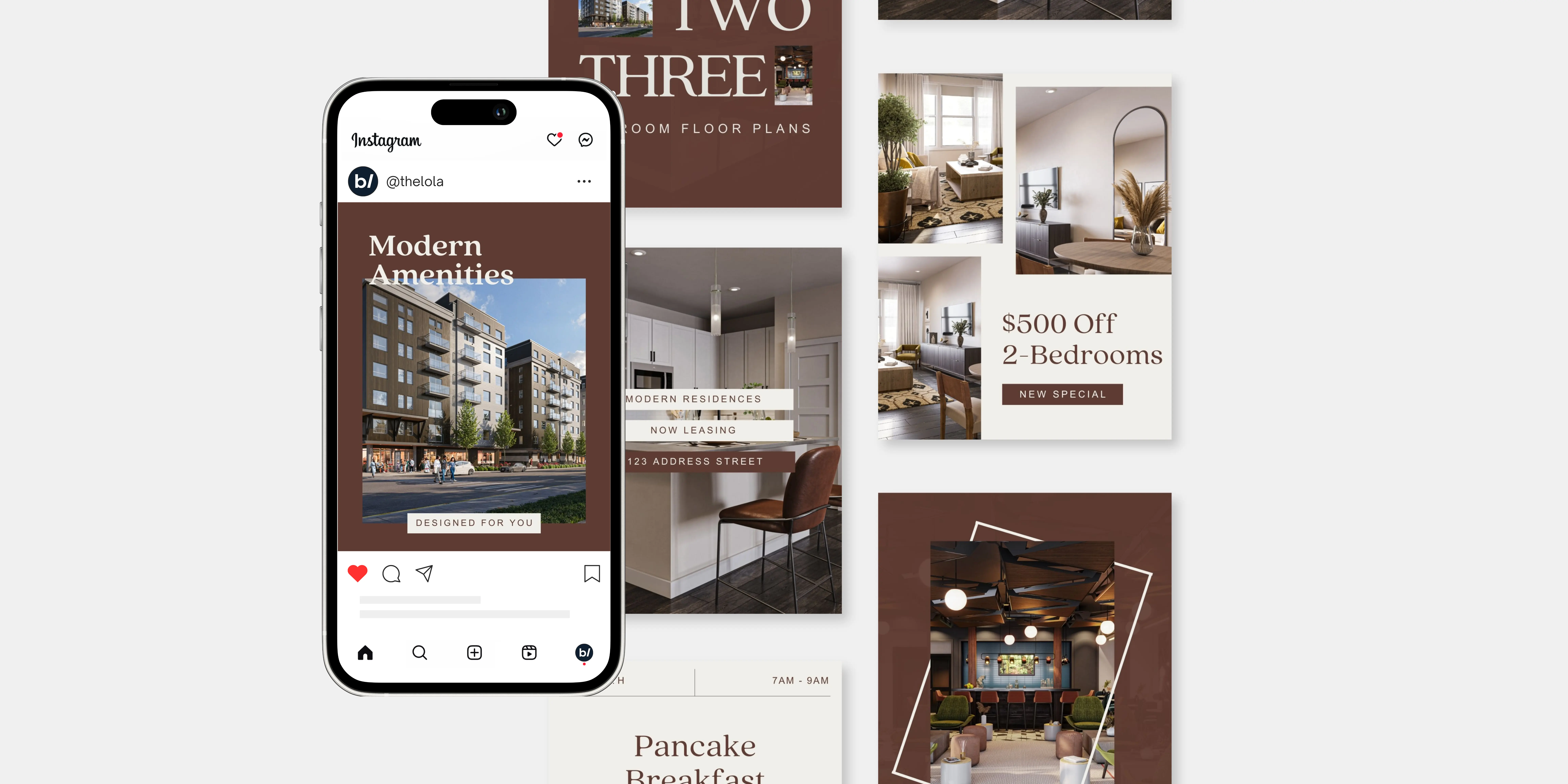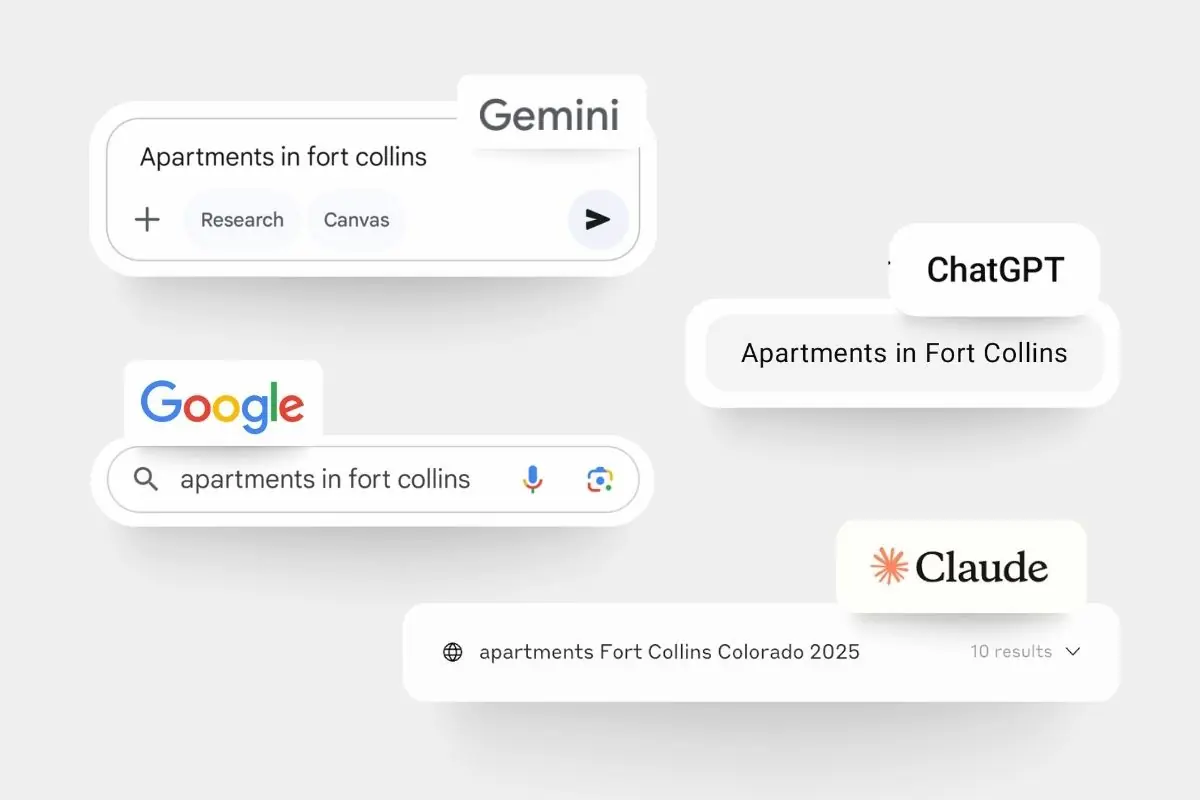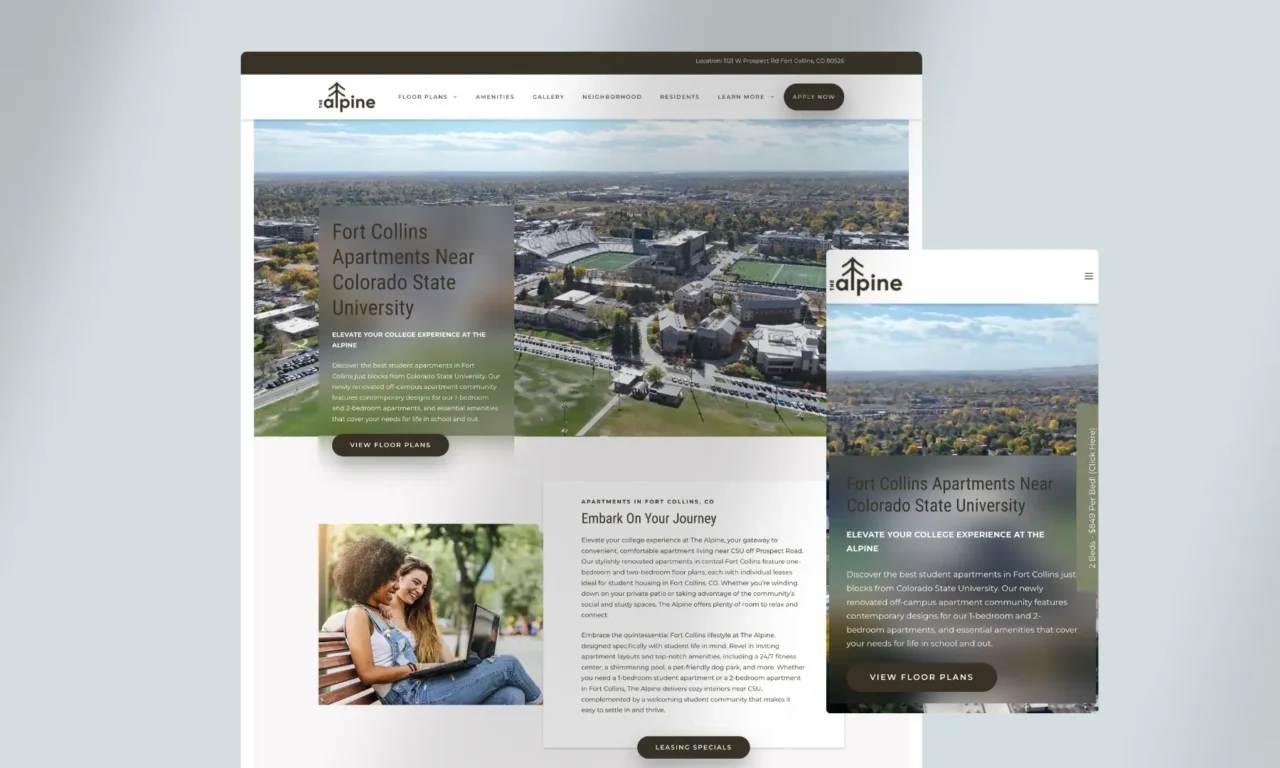Today’s digital landscape is crowded—and that’s putting it lightly. For multifamily operators, standing out online isn’t just a nice-to-have; it’s a must. Your future residents are searching constantly, comparing options, reading reviews, and narrowing down choices—all before they ever book a tour.
And that’s exactly why local SEO matters.
Renters aren’t making decisions in the blink of an eye. They’re researching, weighing pros and cons, and exploring apartment communities in their desired neighborhoods. The good news? That gives you a window to show up strategically and consistently at the right moments in their search.
With the right apartment local SEO strategies in place, you’re not just hoping to be found. You’re guiding potential residents along a clear, optimized path toward your property before they ever click “Schedule a Tour.”
Local SEO is your behind-the-scenes engine, making sure your apartment community shows up when (and where) people are actively searching. Let’s break down how it works—and why it still makes a measurable impact.
Why Local SEO Still Matters for Apartment Communities
Local SEO connects search intent with visibility. It’s not about shouting louder—it’s about showing up at the exact moment someone is looking for “apartments in [your city] with a pool” or “pet-friendly apartments near downtown.”
Unlike paid ads that disappear the second your budget does, SEO builds long-term visibility. It positions your content organically, meaning search engines recommend your property as a relevant match, not because you paid to be there, but because your content aligns with what people want to find.
That’s where keyword strategy comes in. Local SEO is powered by targeted phrases that your ideal residents are already typing into Google. If your website and content include those keywords in meaningful ways, your chances of landing in those local search results skyrocket.
When done right, local SEO helps ensure that the right people—those actively searching for a place to live in your area—find your apartment community at just the right time.
Common Local SEO Challenges for Apartment Property Managers
Why doesn’t your apartment website show up in local search results, even when you’re doing “apartment SEO”?
Here’s where many communities fall short:
- Relying too heavily on ILS’s platforms like Apartments.com or Zillow, without building up your own content
- Inconsistent or incorrect business listings across online directories (NAP: name, address, phone)
- A neglected or poorly optimized Google Business Profile
- Thin or duplicated content on your community’s location pages
Local SEO for apartment communities isn’t a set-it-and-forget-it task. It requires a hyper-local, strategic approach that speaks directly to renters in your target area.
Up next, we’ll walk through five practical strategies to boost your local rankings, connect with qualified renters, and turn visibility into signed leases.

Apartment SEO Tips and Strategies
Let’s get into the good stuff—the actual tactics you can implement to move the needle. Apartment SEO isn’t about checking one box. It’s a layered strategy that helps your apartment community show up where it counts and convert that visibility into qualified leads.
Here are five proven strategies to strengthen your apartment SEO game:
- Research the right keywords
- Create content that supports local visibility
- Optimize your website for both SEO and user experience
- Start a blog to build authority
- Leverage your Google Business Profile and local listings
1. Research the Right Keywords for Apartment Local SEO
As mentioned before, at the core of every SEO strategy are keywords, so before you do anything else, ensure that you’re targeting the right keywords that are going to drive action.
Consumers use specific search terms or keywords when researching something online. If you understand which keywords your potential residents use most commonly, you can position your content in front of them to generate more traffic for your website, blog, or a specific landing page.
In other words, you don’t choose which keywords to rank for. Instead, you research search intent from your target audience and pick keywords from there. If you want to make the most out of apartment search engine optimization, you’ll have to focus your content strategy on what people want to know rather than what you want to tell them. That said, here are a few tips for researching keywords that drive results:
- Choose keywords relevant to your content.
- Always check the volume for a specific keyword.
- Create a keyword list (you won’t use all of them).
- Check which keywords your competitors are using.
- Prioritize a combination of short-tail and long-tail keywords.
- Always check keyword competitiveness.
Tools like SEMrush, Ahrefs, and Google’s Keyword Planner can help you gather this data. Just remember: The goal isn’t to chase traffic. It’s to attract the right traffic—renters looking for a community like yours.
2. Create Content That Supports Local Visibility
At this point, you should have enough keywords to base your content strategy around. Now, it’s time to create amazing content that will both rank well with search engines and resonate with your target audience.
The best way to achieve this is to ensure your content is very informative, educational, and perhaps even a bit entertaining. After all, you don’t want to make things too boring and monotonous. Making sure your content ranks well with search engines is simple enough.
All you have to do is follow the E-E-A-T principle, which stands for expertise, authoritativeness, and trustworthiness. This adds quality to your content and makes it more appealing to your audience.
Instead of just listing amenities, develop content that includes nearby landmarks, community features, or renter FAQs for your neighborhood.
Examples of content ideas:
- “Best Apartments Near Downtown [City] with Balconies”
- “What Renters Should Know About [Neighborhood] Living”
- “Apartment Leasing Tips for First-Time Renters in [City]”
Follow the E-E-A-T principle (Expertise, Experience, Authoritativeness, Trustworthiness) and include:
- Clear CTAs that reflect geographic focuses.
- Original photos of the property and area
- Location-specific headers (H2s)
- Reviews or testimonials from residents
3. Optimize Your Website
Now that your content and keyword strategy are on point, it’s time to fine-tune your website so search engines (and users) can find, navigate, and trust it.
This starts with on-page SEO: optimizing each page’s title tags, headers, meta descriptions, image alt text, and URL structure using your target keywords. But on-page SEO isn’t just for bots—it makes your site easier to understand and more compelling for visitors, too.
Here’s what you’ll want to prioritize:
- Use relevant keywords in H1s, H2s, and page titles
- Write concise, engaging meta descriptions that encourage clicks
- Internally link pages to guide users through your site
- Add schema markup to give search engines more context about your property
Since you’re trying to leverage apartment SEO to your advantage as much as possible, you’ll also have to show search engines that your website is worthy from a functional point of view. Search engines look at technical aspects of your website to determine if it’s user-friendly enough to recommend to consumers.
Use this technical SEO checklist to ensure your website meets modern standards:
- Improve page speed and loading times
- Secure your site with HTTPS
- Make sure it’s fully mobile-responsive
- Build intuitive, user-friendly navigation
- Eliminate duplicate content and fix broken links or redirects
- Create a clean website architecture with clear page hierarchy
- Submit and polish your XML sitemap
- Use a robots.txt file to guide search engine crawlers effectively
A well-optimized site is the silent MVP of your marketing strategy—it makes everything else work better. And when you get it right, both Google and prospective residents will take notice.
4. Start a Blog That Supports Apartment Local SEO
Launching a blog isn’t just a nice-to-have—it’s a powerful lever for long-term SEO growth. In fact, blogging is one of the most effective ways to continuously build visibility, engage renters, and drive qualified traffic back to your site.
Why? Because content drives everything. It powers your social media presence, fills your email newsletters, supports your PPC campaigns—and when it’s done right, it brings in long-tail organic traffic you didn’t even know you were missing.
A well-maintained blog gives you a growing library of renter-focused content you can share across all your marketing channels. But from an SEO standpoint, it also gives search engines fresh content to crawl, more keywords to index, and a clearer picture of your expertise.
When we talk about SEO for apartments, search engines can do their part, but you must also do yours if you want both the rankings and qualified leads. Here’s how your blog can enhance local rankings:
- Write neighborhood guides and renter resource roundups
- Answer hyperlocal questions (e.g., “Best coffee shops near [property name]”)
- Recap local events, farmer’s markets, or festivals
- Feature Q&As with team members or resident spotlights to build community feel
Publishing this kind of content signals to search engines (and to renters) that your property isn’t just a place to live—it’s a meaningful part of the local community.
Pro tip: This strategy also helps you capture long-tail keyword searches—like “affordable apartments near downtown Boise”—that can drive high-intent traffic straight to your site.
5. Leverage Your Google Business Profile & Local Listings
Your Google Business Profile (GBP) is one of the most important tools in your apartment local SEO toolkit. It’s often the first impression a potential resident has of your community—whether they’re searching “apartments near me” or scoping out properties in a specific neighborhood.
Local SEO is technically part of off-page SEO, but for multifamily properties, it deserves center stage. Why? Because it allows you to show up in map packs, mobile search results, and voice searches—all tied directly to your geographic footprint.
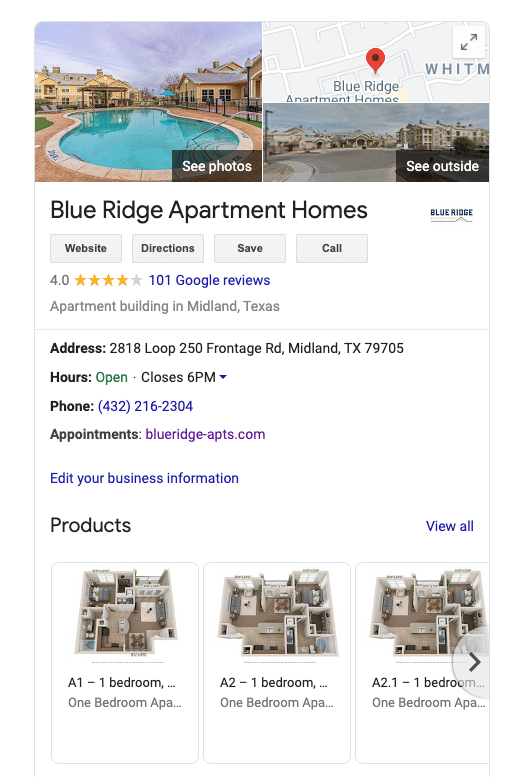
Top Local SEO Tips for Apartment Listings:
- Do a second round of keyword research focused on local modifiers like “near me,” “[city] apartments,” and neighborhood-specific phrases
- Make sure your Google Business Profile is fully updated: NAP info (Name, Address, Phone), hours, services, and amenities
- Post updates and photos regularly—treat your GBP like a mini social media profile
- Submit your property to other relevant local directories (Yelp, ApartmentRatings, etc.)
- Proactively gather positive reviews from residents
- Respond promptly and professionally to every review—yes, even the negative ones
This kind of engagement builds trust with both search engines and prospects. It tells Google that you’re active, reputable, and worth recommending—while also helping you attract more local traffic and high-quality leads.
Perfect Your Local Apartment SEO with Brindle
Let’s be real: apartment SEO isn’t a one-and-done checklist. It’s an ongoing process—and one that can quickly become overwhelming when you’re also juggling renewals, maintenance, and resident events.
That’s where we come in.
At Brindle, we specialize in helping multifamily teams like yours take the guesswork out of SEO. We’ve spent years refining what works, and we bring that expertise to every strategy we create—so your community doesn’t just show up in search… it stands out.
We also offer other multifamily marketing services that include:
- Custom-built apartment websites optimized from the ground up
- Complete brand identity design (logos, colors, tone)
- Strategic content creation and social media management
- Targeted paid advertising (PPC) to support your organic efforts
With Brindle, you don’t get a cookie-cutter solution—you get a marketing partner that understands the nuances of multifamily, executes with precision, and sticks around for the follow-through.
Ready to turn searches into signed leases? Let’s talk.
Final Thoughts: Mastering Local SEO for Your Apartment Marketing Strategy
Local SEO is one of the most cost-effective ways to connect with renters who are already searching for what your community offers. And when it’s done well, it doesn’t just improve visibility—it drives more tours, more applications, and more long-term residents.
By focusing on high-intent local keywords, creating helpful content, optimizing your website, and staying active on your Google Business Profile, you can start seeing stronger organic traffic and better-qualified leads.
And if you’re ready to elevate that strategy, Brindle is here to help. Our apartment SEO services are designed specifically for multifamily operators who want results and who want a marketing team that actually delivers.
